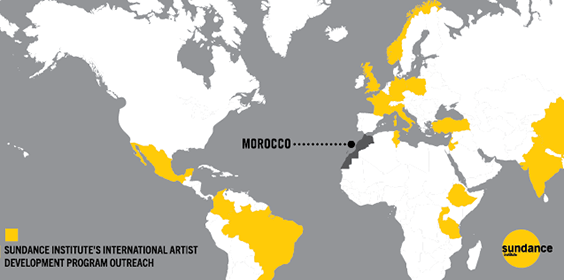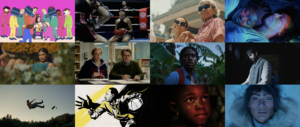New York, NY — Sundance Institute today announced a significant expansion of its international cultural exchange programs for independent artists with a new, multi-year initiative to support theatre-makers from the Middle East and North Africa (MENA). With the goal of creating new opportunities for cross-cultural connectedness and in-depth mutual artistic reflection and exploration, the Institute will expand its existing international Labs to include a pilot Theatre Lab in MENA, to take place in May 2016. Theatre artists in the U.S. and from MENA can submit their work for consideration for this Lab as well as a new Theatre-Makers Residency at the Sundance Resort in Utah in summer 2016 through October 15 at sundance.org/theatre in a new application process. Application guidelines are also available in Arabic and French.
Robert Redford, President and Founder of Sundance Institute, said, “We believe stories have the power to impact our culture and build a more engaged society. With a spirit of experimentation and exchange at the core of our work, we hope our support for artists in the Middle East and North Africa will help the most interesting voices reach a global audience.”
Under the supervision of Sundance Institute Theatre Program Artistic Director Philip Himberg and Producing Director Christopher Hibma and led by Middle East/North Africa Manager Jumana Al-Yasiri, the Theatre Lab in MENA will replace the annual Theatre Lab in Utah in 2016, which over the past three decades has provided critical support and development to theatre works including the two most recent Tony Award winners for Best Musical, Lisa Kron and Jeanine Tesori’s Fun Home and Robert L. Freedman & Steven Lutvak’s A Gentleman’s Guide to Love and Murder, as well as titles such as ToasT, Appropriate, Circle Mirror Transformation, An Iliad, The Lily’s Revenge, The Good Negro, The Light in the Piazza, Passing Strange, Stuck Elevator, Spring Awakening, Laramie Project and I Am My Own Wife. Up to eight projects by theatre-makers (with equal representation from both the U.S. and Arabic-speaking countries) will be selected to participate in the Lab, taking place at the Fellah Hotel, in collaboration with Dar al-Ma’mûn. The Institute will provide transportation, rehearsal space, dramaturgical support, and an acting company, creating an immersive environment where artists can experiment and see their work take shape. The Lab culminates in a closed presentation of each project for Lab participants, followed by a productive feedback session. For the Lab, the Institute will collaborate with Fellah Hotel, Dar al-Ma’mûn, Sahara Experiences and the Morocco National Tourist Office.
The Institute’s programs in MENA extend more than 10 years and include creative and financial support for documentary and feature film with Labs, workshops and collaborations. The Institute’s Rawi Screenwriters Lab, launched in 2005 with the Royal Film Commission of Jordan, offers an intensive five-day program to independent screenwriters in the region who are working on their first or second narrative screenplays. The Institute has also deepened its work in the region with documentary initiatives with the Arab Fund for Arts and Culture, the Morocco-based Ecole supérieure des arts visuels de Marrakech, and the Greenhouse program.
Expanding the Institute’s work in MENA to include dedicated support for theatre artists acknowledges both the strength of talent in the region and an identified need for cross-cultural exchange with U.S. and other international artists and audiences.
Himberg said, “We hope this new initiative will challenge the American theatre community to embrace a broader definition of identity and creativity. In the same way, we’re looking to support the voices of MENA artists creating innovative and risk-taking work and connect them to their artistic peers in the U.S.”
Al-Yasiri said, “It is our goal to build a program across the MENA region and for its artists wherever they might currently be based that lays the groundwork for deepened cross-cultural connectedness, knowing that our relationships with each other can allow for further artistic innovation and mutual inspiration among theatre-makers from different parts of the world.”
The Institute’s longstanding international Labs offer targeted support to independent artists in countries around the world. Building on the Institute’s renowned Lab model that encourages creative innovation and incorporates one-on-one project guidance from distinguished Dramaturgs and Creative Advisors, the Institute aims to work with local and regional partner organizations to identify independent artistic communities and movements to support, actively contributing to local capacity for development or production. After seeding Labs in Brazil, Mexico, Central Europe and around East Africa, the Institute currently hosts Labs in Jordan, Turkey, India, China and Japan. The Institute also invites international filmmakers to participate in its signature Labs in the U.S.
In addition to taking the cornerstone Theatre Lab overseas, the new Theatre-Makers Residency at the Sundance Resort in Utah will offer six artists the opportunity for early development. Writers writing alone or in two-person collaborative teams will utilize the support of a Dramaturg, without actors or performers. Participating artists will also engage with artists attending the Institute’s Screenwriters Lab and Documentary Edit Lab, which take place concurrently.
The Sundance Institute Theatre Program is supported by an endowment from the Doris Duke Charitable Foundation, with generous additional support from The Andrew W. Mellon Foundation; Time Warner Foundation; Perry and Martin Granoff; LUMA Foundation; the John and Marcia Price Family Foundation; National Endowment for the Arts; The Shubert Foundation, Inc.; Wendy vanden Heuvel; The Harold and Mimi Steinberg Charitable Trust; Karen Lauder; and Joan and George Hornig.
Sundance Institute Theatre Program
The Theatre Program has been a core component of Sundance Institute since Robert Redford founded the Institute in 1981. The Theatre Program identifies and assists emerging theatre artists, contributes to the creative growth of established artists, and encourages and supports the development of new work for the stage. Under the guidance of Artistic Director Philip Himberg and Producing Director Christopher Hibma, the Theatre Program is one of the leading play development programs in the United States. Titles such as Appropriate, Fun Home, A Gentleman’s Guide to Love and Murder, Circle Mirror Transformation, An Iliad, The Lily’s Revenge, The Good Negro, The Light in the Piazza, Passing Strange, Stuck Elevator, Spring Awakening, The Laramie Project and I Am My Own Wife have gone from Theatre Program Labs to production from coast to coast and internationally, garnering multiple Pulitzers, Tonys, OBIEs and other recognition. The Theatre Program’s International Initiative currently offers Labs, cross-cultural exchange, mentorship and exposure to artists primarily from the Middle East & North Africa and continuing support for artists in six East African countries. The Theatre Program’s newest initiatives are the Theatre Directors Retreat in Arles France and the Writers Playwrights Studio at Flying Point. sundance.org/theatre
Sundance Institute
Founded in 1981 by Robert Redford, Sundance Institute is a nonprofit organization that provides and preserves the space for artists in film, theatre, and new media to create and thrive. The Institute’s signature Labs, granting, and mentorship programs, dedicated to developing new work, take place throughout the year in the U.S. and internationally. The Sundance Film Festival and other public programs connect audiences to artists in igniting new ideas, discovering original voices, and building a community dedicated to independent storytelling. Sundance Institute has supported such projects as Beasts of the Southern Wild, Fruitvale Station, Sin Nombre, The Invisible War, The Square, Dirty Wars, Spring Awakening, A Gentleman’s Guide to Love and Murder and Fun Home. Join Sundance Institute on Facebook, Instagram, Twitter and YouTube.
# # #




